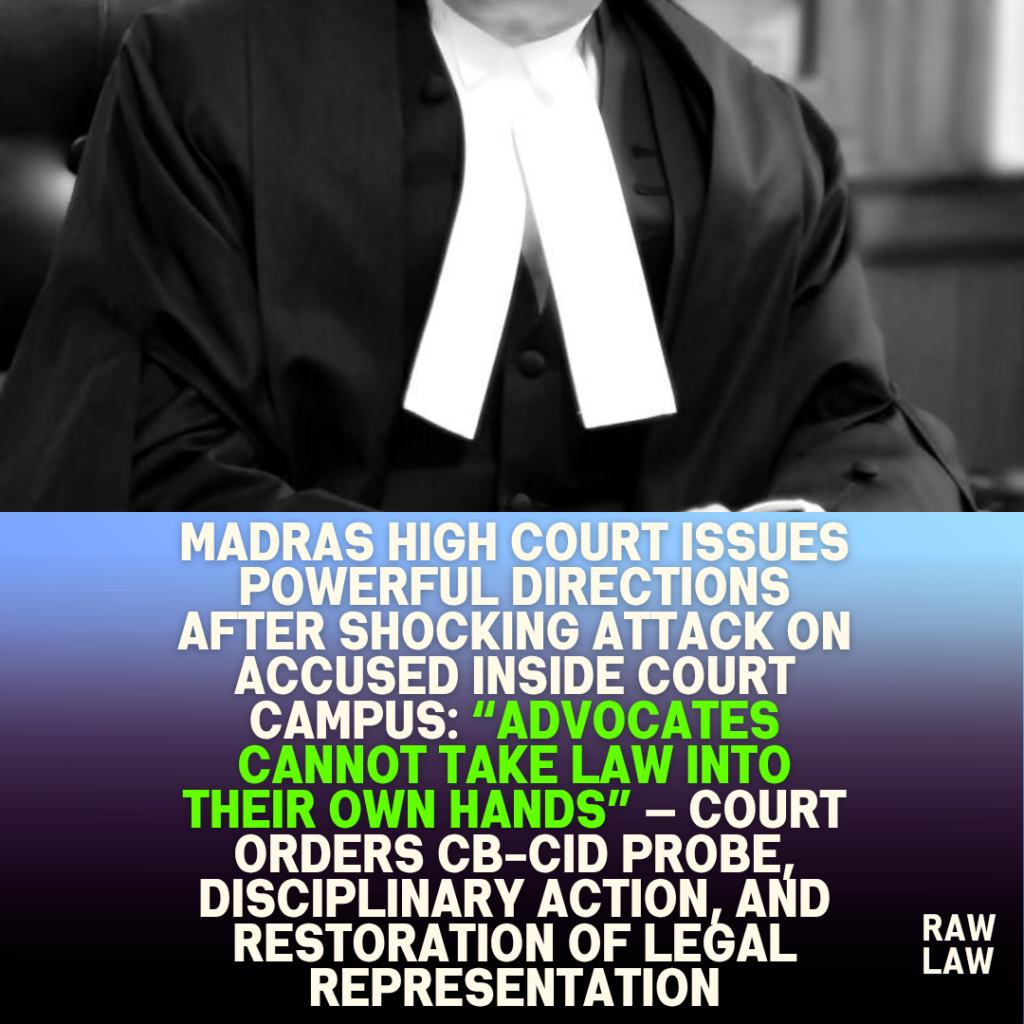Court’s decision
The Madras High Court delivered a forceful order condemning the unlawful attack on an accused within the court premises by a group of advocates and the disturbing refusal of certain Bar Associations to allow any lawyer to represent him. The Court held that such conduct violates Articles 21 and 22, undermines the rule of law, and constitutes a direct assault on the justice delivery system. Declaring that “advocates cannot behave like street-level vigilantes,” the Court ordered transfer of the investigation to the CB-CID, directed action against errant police personnel, and instructed the Bar Council to initiate disciplinary proceedings under Section 35 of the Advocates Act. The Court also protected the accused’s right to counsel.
Facts
The petitioner, an accused in a criminal case, was produced at the judicial complex for remand formalities when a group of approximately fifty advocates allegedly assaulted him, abused him, and prevented him from being represented by counsel. The petitioner claimed that the attack was premeditated and politically motivated, carried out in the presence of police officials who failed to intervene. The Bar Association of the concerned district court allegedly passed a resolution deciding that no advocate should represent the accused. The refusal of representation resulted in the petitioner being unrepresented during crucial stages of the proceedings, prompting him to file the present writ petition seeking police protection and disciplinary action.
Issues
The Madras High Court considered the following issues:
- Whether advocates can collectively resolve to deny legal representation to an accused.
- Whether assault by advocates within the court complex constitutes contemptuous and criminal conduct necessitating disciplinary action.
- Whether police failure to prevent the mob attack violated constitutional guarantees of fair procedure.
- Whether the investigation into the assault should be transferred away from local police due to allegations of collusion.
- Whether Bar Associations can interfere with statutory rights of the accused and the constitutional duty of advocates.
Petitioner’s arguments
The petitioner asserted that the mob attack was orchestrated by members of the legal fraternity and that police “stood by as mute spectators,” thereby enabling the assault. He argued that the Bar Association’s resolution prohibiting any advocate from defending him amounted to an unconstitutional boycott violating Articles 21 and 22. He submitted that such resolutions have repeatedly been condemned by the Supreme Court. He emphasised that he feared for his life and could not access the court safely without protection. He sought transfer of investigation, protection from further attacks, and disciplinary action against the advocates involved in the violence and obstruction of access to justice.
Respondent’s arguments
The State authorities claimed that police had acted promptly and had taken steps to prevent escalation. They denied allegations of collusion and asserted that necessary FIRs had been registered. They argued that matters relating to Bar Association resolutions were beyond the State’s remit and subject to regulation by the Bar Council. The local Bar Association denied passing any formal resolution restricting representation but conceded that tensions were high following the alleged offence. The respondents contended that an enquiry was ongoing and no separate intervention was necessary.
Analysis of the law
The Madras High Court reiterated that legal representation is a non-negotiable constitutional right under Articles 21 and 22, and any attempt by advocates or Bar Associations to prevent representation amounts to contempt of court and professional misconduct. The Court cited the Supreme Court’s repeated condemnation of Bar boycotts and strikes, stressing that advocates owe a duty to the court above all. The Court also analysed police obligations under the Criminal Procedure Code and constitutional jurisprudence, holding that police must ensure safety of every person produced in custody and cannot ignore mob violence. The Court emphasized that the justice system collapses when lawyers become aggressors.
Precedent analysis
The Court referred to the Supreme Court’s landmark decision in A.S. Mohammed Rafi, where collective resolutions preventing advocates from appearing for an accused were held illegal, unethical, and unconstitutional. The Court cited decisions condemning Bar strikes (Harish Uppal), boycotts, and resolutions interfering with the administration of justice. It also relied on judgments holding that failure of police to protect accused persons within court premises constitutes a violation of Article 21. These precedents guided the Court in directing disciplinary and criminal action.
Court’s reasoning
The Court held that the allegations, supported by video footage and media material placed before it, warranted serious judicial concern. It found prima facie that advocates had entered the court campus not as officers of the court but as aggressors. The judiciary, the Court reasoned, must intervene when the legal profession becomes a threat to the justice system. The Court noted that the police explanation was unsatisfactory, particularly when the assault occurred within the court complex. It concluded that only an independent agency like the CB-CID could conduct a fair investigation. It also held that Bar Associations cannot interfere with statutory rights and must face consequences for unethical conduct.
Conclusion
The Madras High Court ordered:
– Transfer of the investigation into the assault to the CB-CID.
– Disciplinary proceedings by the Bar Council under Section 35 of the Advocates Act against advocates involved in the violence or boycott.
– Departmental action against negligent police officials.
– Mandatory police protection to the accused during court appearances.
– Directions to ensure that no Bar Association obstructs legal representation.
The writ petition was allowed with strong observations reinforcing the sanctity of courts and the professional responsibilities of advocates.
Implications
This ruling sends a decisive message across Tamil Nadu’s legal community: Bar Associations cannot weaponise collective action to deny representation, intimidate accused persons, or interfere with court functioning. Police cannot abdicate their duty within court precincts. The judgment strengthens constitutional protections for fair trial, ensures accountability for professional misconduct, and reasserts the judiciary’s supervisory authority over court-related violence. It will influence future actions involving mob behaviour by advocates and reinforce disciplinary mechanisms under the Advocates Act.



